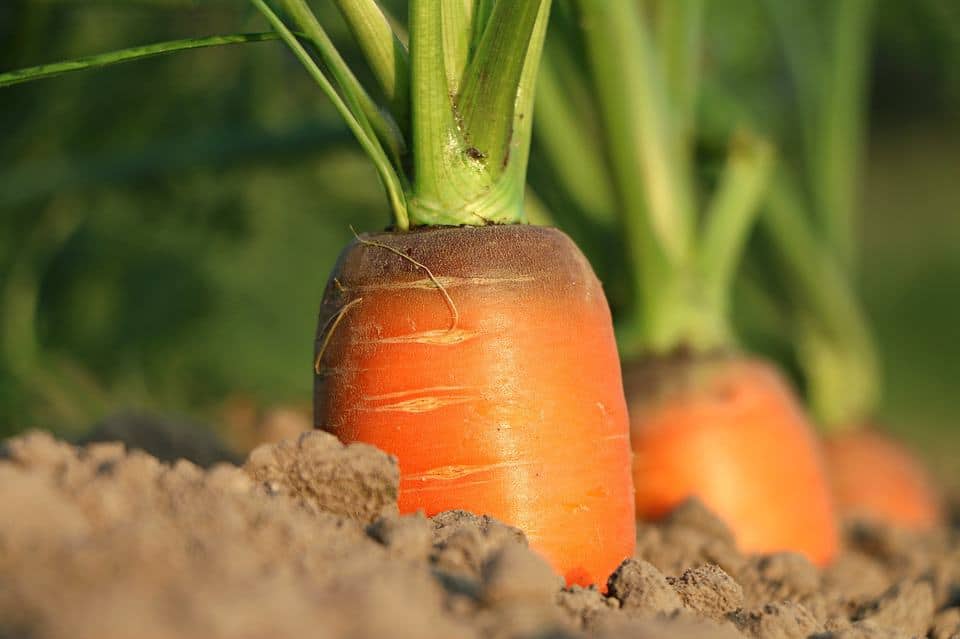Despite being one of the first vegetables gardeners try to grow, growing large, uniform carrots is a challenge. There are many reasons why your carrots may not be growing properly or not growing at all.
Carrots grow best when directly sown, otherwise they may not grow properly. Carrots also have germination issues since they need to be planted shallow and kept moist for 14 to 21 days before they sprout. After germination, carrots may still have difficulty growing in clay, rocky, or compacted soil.
On this page:
Causes of Carrot Seeds Not Germinating
Carrots should always be sown directly instead of transplanted. If you’ve sown your carrot seeds and they haven’t sprouted yet, there are a few possible reasons why.
Carrot seeds tend to take a longer time to germinate compared to other vegetables, usually around 14 to 21 days. If conditions are too wet, they may rot before sprouting, and if they’re too dry, the seeds won’t have a chance to sprout. Always make sure your soil stays moist after sowing. Some people will cover the soil with plastic or a wooden board to keep the surface moist and check periodically until the first seedlings emerge.
Having small seeds, carrots should not be planted deep, no deeper than 1/4 inches (0.6 cm). If they are planted deeper, the seedlings may not have enough energy to get high enough to reach the surface.

Why Are My Carrots So Small?
The most common problem gardeners have is harvesting small, misshapen, or stunted carrots. These carrots are still perfectly edible! This has no impact on taste, but it does feel a bit disappointing when you pull out a tiny carrot with weird twists and turns.
As I mentioned earlier, carrots should always be directly sown in the ground instead of started indoors and transplanted. The reason is that the part of the carrot we eat is just a really large taproot. However, taproots will only grow straight down if not disturbed.
Transplanting carrots causes small, deformed carrots for two reasons. First, when you sow a carrot in a small pot or seed starting tray, the main taproot quickly grows down and then stops when it reaches the bottom, and may start coiling around the bottom with the other roots. Right there, you’ve already got a future twisty carrot. But then when transplanting, those tender roots may also get damaged, which can lead to overall stunted root development and smaller carrots overall.
Another cause of undersized, twisty carrots is compacted, rocky, or clay soil. A carrot plant needs to push its taproot down into the soil and then expand it into a full-sized carrot. If the carrot’s taproot finds a stone in its path, it will grow around it. If your soil is very compacted, it may lead to your carrots looking thin and weak.
If you have heavy, clay soil, you can opt to grow thicker, stockier varieties of carrots. These types of carrots have a strong, but shorter root so they can push through heavy soil. Because they are shorter, they are also good varieties of carrots for containers.
Carrots need loose, well-draining, stone-free soil to grow long, thick, uniform roots. Loamy soil is ideal. Always make sure your soil is loosened before planting and is free from rocks. Adding organic matter like compost and some sand may help heavy clay soils.
Why Are My Carrot Tops Not Growing Carrots?
It’s really fun to watch carrot tops grow back from leftover carrots from the grocery store. However, if you want to grow actual carrots, this unfortunately won’t work the way we think it will.
If you take a grocery store carrot and plant the top, you will usually see it grow new leaves. You may even notice little root hairs starting to grow out the bottom of the carrot top. But you won’t get a new taproot to form, and the taproot is that large, long root we eat.
However, not only can you eat carrot tops as greens, those carrot tops will eventually produce flowers and carrot seeds which you can then plant in your garden! So yes, you can grow more carrots from grocery store carrots, but only indirectly by growing out the green tops, letting them flower, and saving the seeds to plant carrots.
